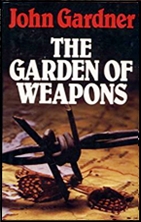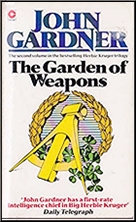Sun 24 May 2020
A 1001 Midnights Review: JOHN GARDNER – The Garden of Weapons.
Posted by Steve under 1001 Midnights , Reviews[9] Comments
by George Kelley & Bill Pronzini

JOHN GARDNER – The Garden of Weapons. McGraw-Hill, US. hardcover, 1981. Mysterious Press, US, paperback, 1984. Published earlier in the UK by Hodder, hardcover, 1980.
John Gardner is one of the most versatile British writers in the espionage genre. He gained early recognition for his Boysie Oakes series – The Liquidators (1964), Amber Nine (1966), and five others which he created in the hope they would be an “amusing counterirritant to the excesses” of James Bond; these were written in the black-humor style characteristic of the Sixties. In the Seventies, Gardner scored additional critical and sales triumphs with a much different type of series – one featuring Sherlock Holmes’s archenemy, Professor Moriarity, in The Retum of Moriarity (1974) and The Revenge of Moriarity (1975). And in the Eighties, Gardner returned to the frantic world of Bondian spies — literally — when he began a series of new 007 adventures.

But Gardner’s best book to date is not one featuring a series character; it is the realistic espionage thriller The Garden of Weapons, which begins when a KGB defector walks into the British Consulate in West Berlin and demands to speak with Big Herbie Kruger, a legendary figure in intelligence circles. Kruger’s interrogation of the defector reveals that the greatest of Kruger’s intelligence coups — a group of six informants known as the Telegraph Boys — has been penetrated by a Soviet spy. Kruger decides to go undercover and eliminate the double agent himself. without the knowledge or consent of British Intelligence.
Posing as an American tourist, Kruger enters East Berlin to carry out his deadly self-appointed miss1on. But the task is hardly a simple one; and Gardner’s plot is full of Byzantine twists and turns involving the East Germans, the KGB, and British Intelligence. Any reader who enjoys espionage fiction will find The Garden of Weapons a small masterpiece of its type.
Another non-series Gardner thriller in the same vein is The Werewolf Trace (1977), which has been called “a compulsively readable thriller with delicately handled paranormal undertones and a bitter ending.â€
———
Reprinted with permission from 1001 Midnights, edited by Bill Pronzini & Marcia Muller and published by The Battered Silicon Dispatch Box, 2007. Copyright © 1986, 2007 by the Pronzini-Muller Family Trust.
Bibliographic Update: As it so happens, The Garden of Weapons was not a standalone. There were seven in all, all but one published after this one:
The Herbie Kruger series —
The Nostradamus Traitor (n.) Hodder 1979.
The Garden of Weapons (n.) Hodder 1980.
The Quiet Dogs (n.) Hodder 1982.
The Secret Houses (n.) Bantam 1988.
The Secret Families (n.) Bantam 1989.
Maestro (n.) Bantam 1993.
Confessor (n.) Bantam 1995.
May 24th, 2020 at 7:25 pm
I really liked The Werewolf Trace.
May 24th, 2020 at 7:58 pm
I read one of the Boysie Oakes books, thought it was so-so, but that’s been it for me and Gardner. I have no excuse for missing his Bond book nor the Moriarity’s, although I own them all.
As far as this series is concerned, this is the first I’ve known about it.
May 24th, 2020 at 8:33 pm
I will have to check if I have any of them, but the two Secret books (Houses and Families) along with Secret Generations form a trilogy and are a separate series according to Fantastic Fiction.
May 24th, 2020 at 9:02 pm
I believe there was a crossover in characters for the Secret books, and that Herbie Kruger somehow showed up in two of the tree of them. I’ll see if I can find a reference that will verify that.
May 24th, 2020 at 9:10 pm
The fellow who does the Spy Guys and Gals site says:
“Note that the author, Mr. Gardner, also wrote a three-book series called the Secret Trilogy. In the third book, Kruger makes his entrance as a young agent. His role is fairly small but important. It is more important in the understanding of the character in this series.”
And if he was in one, my other source (Hubin) is probably right, he was in two.
https://spyguysandgals.com/sgShowChar.aspx?id=567
If you’re a fan of spy fiction, you will absolutely love this site!
May 24th, 2020 at 9:10 pm
I read quite a few of the Gardner Bond books; uneven but entertaining. Not in the Fleming class, but would have made rather fun films.
May 24th, 2020 at 10:45 pm
Strangely enough, only two of Gardner’s books were made into films: THE LIQUIDATOR and A COMPLETE STATE OF DEATH as STONE COLD KILLER (as David Vineyard points out in the comment below, which he left before this one). Why none his Bond books were ever made into Bond movies, I couldn’t tell you. You’re right, Nick. Someone has missed the boat there.
May 24th, 2020 at 10:06 pm
I loved the Boysie Oakes books and am happy to say all are available on Kindle. Of his Bond’s some are better than others such as ROLE OF HONOUR, NO DEAL MR. BOND, NOBODY LIVES FOREVER, FOR SPECIAL SERVICES, NEVER SEND FLOWERS and WIN LOSE OR DIE, and a few just tired like SEAFIRE, COLD, and ICEBREAKER. He also wrote at least two Bond novelizations LICENCE TO KILL and GOLDENEYE.
In addition to Herbie and the Generations Trilogy (yes it is a crossover to some extent, but noT of the Kruger series exactly — a bit like George Smiley showing up in THE SPY WHO CAME IN FROM THE COLD or THE LOOKING GLASS WAR neither of which could be construed as Smiley novels). He also wrote two tough cop novels about Derek Torrey, one of which became an American Charles Bronson movie the COMPLETE STATE OF DEATH as THE STONE KILLER.
Gardner’s last works were a series about a female British cop in the war era, Suzie Mountford running to five titles between 2002 and 2007, and quite well reviewed though I don’t know if they were published here.
He did a number of entertaining standalone novels aside from WEREWOLF TRACE including FLAMINGO, THE DANCING DODO, and GOLGOTHA.
May 25th, 2020 at 8:57 pm
The rights involving the Bond pastiche are somewhat complex when it comes to the movies, and the holders to the rights of the Amis, Gardner, Benson, Faulks, Pearson, Boyd, and Horowitz Bonds as well as the Jim Lawrence stories in the comic strip and the various Bond comic book incarnations do not automatically give them film rights to adapt them, which would involve negotiations with the various writers involved and additional expense to option.
That is why they never discussed doing COLONEL SUN which was a bestseller or any of the Gardner books, though both Gardner and Benson did adaptations of the films.
I don’t know the exact contractual nature, but my understanding is the pastiche are not done on a work for hire basis but a shared royalty one, and it is more as if the character of Bond is licensed to certain writers to use but they retain the rights to their titles characters and plots but not the Fleming name or Bond.
The pastiche are copyrighted to Ian Fleming Publications Ltd. and the Ian Fleming Estate, who as I understand it license the character to the film production company, they are not the same and therefore the books are not available to produce as films without further expensive negotiations with the writers. The 007 film logo for instance is held by Danjaq MGM and UA, and not the Fleming estate.
For practical purposes it is cheaper and simpler to come up with original material based on the Fleming books than get into the whole business of dealing with the individual writers and whether their characters could be used in later films.
It somewhat resembles back when studios would purchase books and stories by Raymond Chandler and other writers and make them as entries in the Falcon of Michael Shayne series, but Chandler still retained the rights to Marlowe and actual adaptations of the books featuring him.